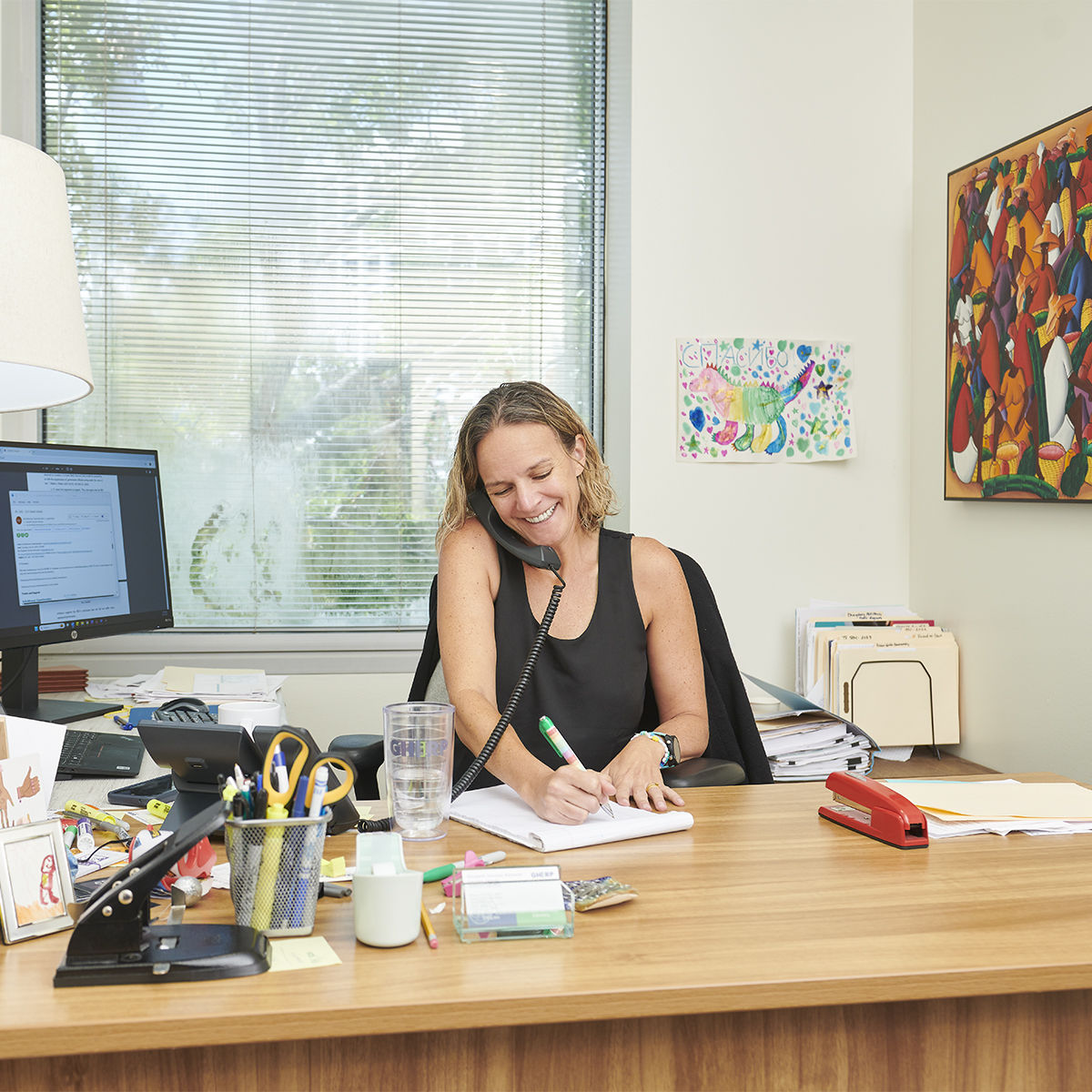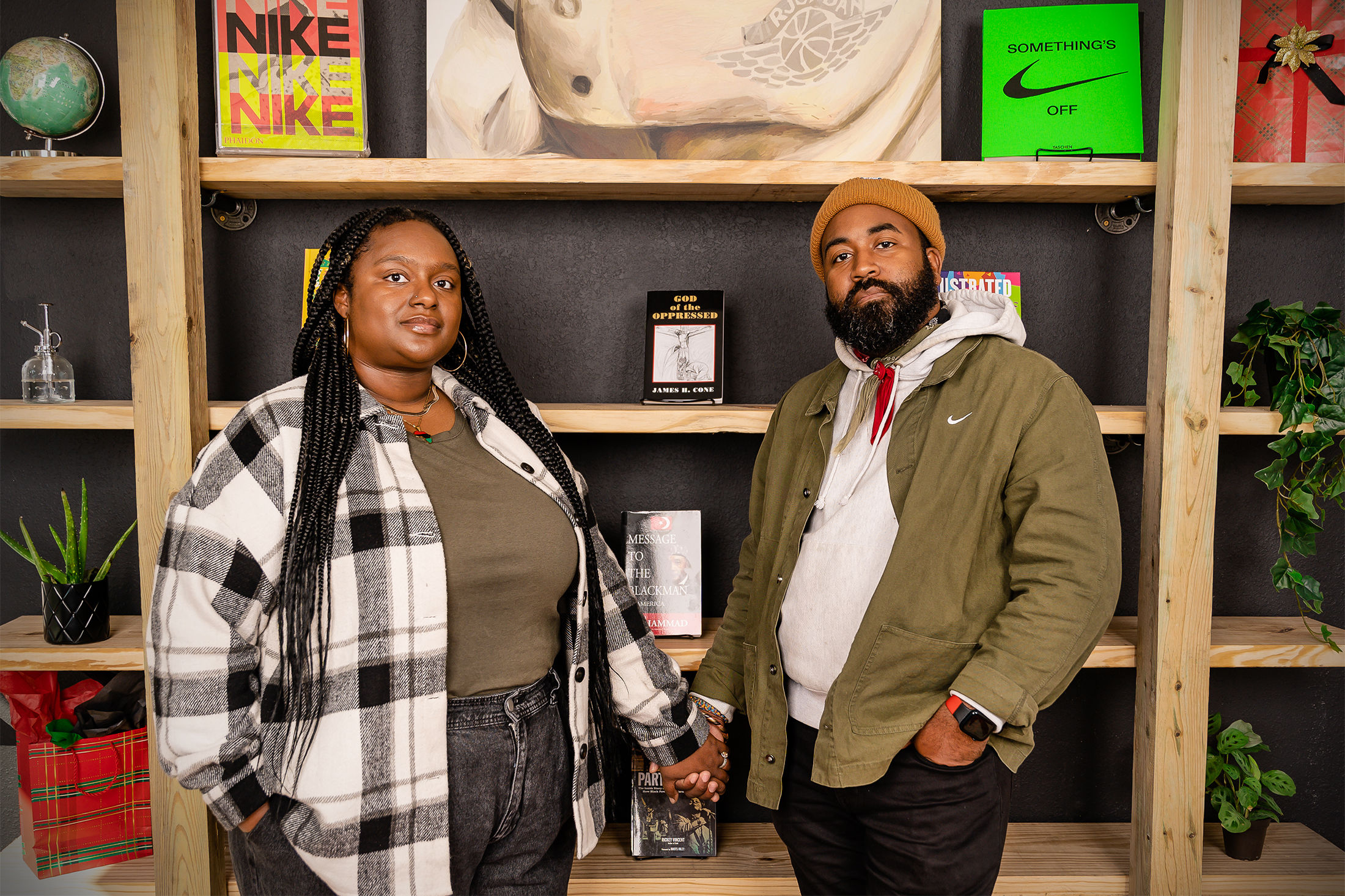Chiqui Sanchez Kennedy Is a Champion for Immigrant Rights

Image: Anthony Rathbun
Editor’s note: This profile was published in August. Chiqui Sanchez Kennedy has since been named a 2024 Houstonian of the Year finalist. Read about the winner and the other runners-up here.
Chiqui Sanchez Kennedy has always loved learning about other cultures. The Houston-based attorney and founder of the Galveston-Houston Immigrant Representation Project has spent more than a decade specializing in immigration law at nonprofit organizations. But she says growing up in one of the US’s most diverse regions played more of a role in her career path than her individual immigrant story.
“Growing up in a multicultural family did make me value diversity, community, and inclusivity from a young age,” says Sanchez Kennedy, 43, who was born in Spain to Spanish and American parents. “But this area has so much color and life in it, and it always made me very interested in learning more about the people around me and their experiences, and to value the different backgrounds I encountered.”
Sanchez Kennedy initially thought she’d pursue a career as a public defender, as she was especially passionate about advocating for people within the criminal justice system who were up against the resources of the state and government. However, after graduating from South Texas College of Law Houston in 2008, she followed her now-husband to the south Texas border, where she ended up landing a job in immigration detention facilities in Los Fresnos, working with unaccompanied minors and detained adults. There, her eyes were opened to the fact that the area was severely lacking in access to legal representation, which meant immigrants were left to go forward with their cases without a lawyer.
“I was shocked to learn that our country detained immigrants who hadn’t committed a crime, no matter their age, who were just here and had no lawful retribution about it, and I was hearing the stories of what people were forced to flee, such as horrific violence perpetrated by parents, spouses, or the government,” she says. “I knew how vital it was for them to access protections to live free from harm and without the fear of their future being cut short.”
After two years living and working on the border, Sanchez Kennedy made two more moves with her husband, first to New York City and then to Miami, continuing to focus heavily on cases involving unaccompanied minors for organizations like Kids in Need of Defense and Catholic Charities Legal Services. In 2016, Sanchez Kennedy, by then a mother of three, and her family made the move back to the Houston area, where she continued this work, first as a program director of the unaccompanied minors program at Catholic Charities of the Archdiocese of Galveston-Houston, before then becoming the director of immigration legal services at YMCA International Services.
Throughout her different career moves, Sanchez Kennedy thought she would eventually land at an organization that shared her vision for what she thought immigrant legal representation should look like. There was just one thing: she felt it didn’t exist. She was looking for an independent organization that wasn’t tied to a larger one with competing interests and priorities. This realization led Sanchez Kennedy, along with her YMCA colleagues and fellow attorneys Liz Hoefer and Vanessa Perez, to leave their jobs in the fall of 2020 to create the Galveston-Houston Immigrant Representation Project (GHIRP).
“After the world shut down and started opening back up little by little, and then with the possibility of [four more years of] the Trump administration, there was just so much uncertainty,” she says. “If we were ever going to make a move, now was the time.”

Image: Anthony Rathbun
GHIRP provides free legal services to low-income immigrants, such as victims of domestic violence, human trafficking, and crime; detained unaccompanied immigrant children; and individuals seeking protection from deportation. This is an important public service: Sanchez Kennedy says that many people don’t realize immigrants don’t have the right to a free attorney. Only 18.6 percent of immigrants in deportation proceedings awaiting resolution in Texas through July 2024 had a lawyer, according to the Transactional Records Access Clearinghouse.
Launching GHIRP immediately brought about challenges for the initial team of three. They learned that obtaining 501(c)(3) status could take up to 14 months, during which time they couldn’t apply for funding. Not only that, they were also required to be actively providing services to be able to apply for funding.
“This was devastating,” Sanchez Kennedy says. They worked for free for eight months, first from her dining room table at her home in Montrose, then her uncle’s office. She called the IRS every day to expedite their case, which was approved in January 2021.
In June 2021, GHIRP officially opened its doors at its current office in Gulfton. The nonprofit was by then made up of five staff members, including a paralegal as well as managing attorney Alexa Sendukas, who makes up the organization’s management team along with Sanchez Kennedy, Hoefer, and Perez. It also had additional staff working out of St. Vincent’s House to serve Galveston clients before opening a second fully staffed office in Galveston in June 2023. The Houston-based GHIRP staff regularly travel to Galveston, where they hold monthly Know Your Rights presentations for the community, as well as other clinics and workshops.
“Galveston seems so close to Houston, but it’s actually so hard for people who are under-resourced and don’t have transportation or a driver’s license to get from Galveston to Houston,” she says. “We felt strongly that Galveston needed to have a full-time immigration legal services organization on the island.”
This initiative has paid off. One of GHIRP’s most notable successes was helping a man from Mexico who had lived as a permanent resident in Galveston for more than 20 years finally obtain citizenship so that his wife, who was undocumented, could apply for lawful permanent residency herself.
“That started with a Know Your Rights presentation where [it turned out] all he needed was a free attorney, but could never get off the island to get one, and [GHIRP’s assistance] resulted in forever changing this couple’s lives,” she says. “Now they’re getting jobs where they can get paid a legitimate wage and their now-adult children aren’t worried about them getting deported.”
Three-and-a-half years in, GHIRP has grown to 38 employees, most of whom are fully bilingual in English and Spanish. No day looks the same for Sanchez Kennedy. Sometimes it’s helping a client who has been mistakenly deported, or a child detained by US Immigration and Customs Enforcement (ICE) who doesn’t have a place to stay, connecting their attorneys to the right people.
But even with the wins, GHIRP continues to face challenges within the community, especially with another presidential election looming this fall. A large portion of the organization’s funding comes from the federal government, so whoever ends up in the White House could have a serious impact on its services and operations.
“The current administration has done things that have made me worry, including stripping immigrants of the right to seek asylum in the US, but Trump himself has promised to support closing the borders and be extremely harsh on immigrants without exception,” she says.
Another ongoing challenge is keeping the community properly informed on basic immigration laws and the services resources like GHIRP offer, as well as debunking common misconceptions. She cites, for example, the difference between seeking asylum and getting asylum, the latter of which is actually a very difficult process with a low success rate.
Most people Sanchez Kennedy meets are on board with legal representation and access to protections for immigrants, but that’s getting lost in the message in a political climate that has become increasingly focused on vilifying immigrants and overgeneralizing their circumstances.
“As a whole, the work that we’re doing is working with people and families who are suffering extreme and unnecessary violence in their homes. They don’t want to flee, but they’re forced to when it’s impossible to safely stay in their homes,” she says. “It’s important for the public to know about the stories behind the humans entering our southern border. Our job is to advocate for them, which is something that should be embraced because it helps to build a community that is diverse. When we’re successful in our work, we’re including more neighbors and community members who are able to contribute in so many ways. We want people to understand that the work we do is important for the community [as a whole], not just for the individuals we serve.”









